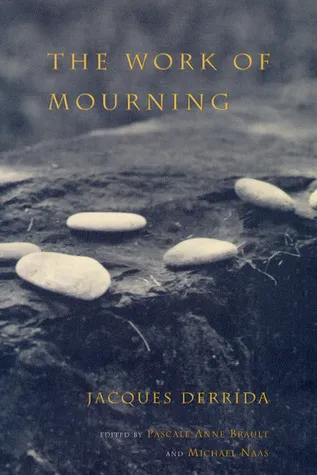The Work of Mourning

Navigating Grief and Loss: Insights from "The Work of Mourning" by Pascale-Anne Brault, Michael Naas, Jacques Derrida
A Compassionate Exploration of Grief
Discovering "The Work of Mourning"
When grief knocks on our door, it's often accompanied by a whirlwind of emotions and questions. In "The Work of Mourning" by Pascale-Anne Brault, Michael Naas, and Jacques Derrida, I found a compassionate guide through the intricate landscape of mourning. This book isn't just an exploration of loss; it's a testament to the complexities of navigating the emotional terrain that follows.
Personal Encounter with Loss
Before delving into the pages of this profound work, I had my own encounter with loss. The death of a loved one left me grappling with the myriad emotions that accompany grief—sadness, confusion, and a profound sense of emptiness. "The Work of Mourning" became a companion in navigating this challenging journey.
Grief as a Unique Experience: Derrida's Perspective
Derrida's Philosophical Lens
The book compiles Derrida's reflections on mourning, offering a unique philosophical lens through which to view the grieving process. Derrida challenges the notion of grief as a universal experience, asserting that each mourning is as unique as the relationship with the departed.
Personal Connection to Uniqueness
Derrida's perspective resonated deeply. Reflecting on my own grief, I recognized the distinctiveness of my mourning process. "The Work of Mourning" encouraged me to embrace the uniqueness of my emotions and experiences, fostering a sense of acceptance in the face of loss.
Language's Limitations: Expressing the Inexpressible
Wrestling with Words
Grief often leaves us grappling with an inability to express the depth of our emotions adequately. Derrida acknowledges the limitations of language in capturing the essence of loss, emphasizing the struggle to articulate the inexpressible.
My Own Linguistic Struggle
Reading about the limitations of language brought back memories of my own attempts to convey the profound impact of loss. "The Work of Mourning" offered solace, validating the struggle to find words that could encapsulate the complexity of grief.
The Art of Eulogies: Honoring the Departed
Eulogies as Performative Acts
Derrida explores the art of eulogies as performative acts that extend beyond mere words. Eulogies, he suggests, are a way of keeping the memory of the departed alive, enacting a form of ongoing dialogue with the absent.
Personal Eulogy Reflection
The notion of eulogies as performative acts struck a chord. It reminded me of the eulogy I delivered for my loved one—a heartfelt attempt to capture the essence of their life. Derrida's insights enriched my understanding of the eulogy as a dynamic, ongoing tribute.
Grieving as a Social Act: Shared Mourning
The Social Dimension of Mourning
"The Work of Mourning" underscores the social dimension of grieving. Derrida posits that mourning is not a solitary endeavor but a shared experience that connects individuals through the collective act of remembering.
Personal Communal Healing
Reflecting on the communal nature of grief, I appreciated the support and shared memories that buoyed me during challenging times. The book reinforced the idea that mourning is not only a personal journey but also a communal healing process.
Conclusion: Embracing the Work of Mourning
A Compassionate Guide
"The Work of Mourning" isn't just a philosophical exploration; it's a compassionate guide through the intricate process of mourning. Derrida, through the lenses of Brault and Naas, offers insights that transcend the theoretical, providing solace and understanding for those grappling with loss.
So, if you find yourself navigating the challenging terrain of grief, consider turning to "The Work of Mourning" for companionship and wisdom.